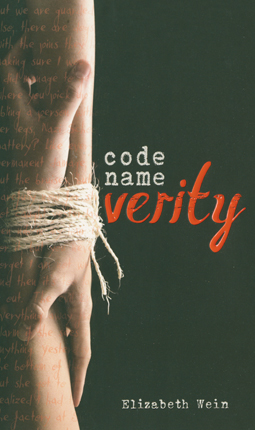Full Text Reviews: Booklist - 05/01/2012 *Starred Review* If you pick up this book, it will be some time before you put your dog-eared, tear-stained copy back down. Wein succeeds on three fronts: historical verisimilitude, gut-wrenching mystery, and a first-person voice of such confidence and flair that the protagonist might become a classic character—if only we knew what to call her. Alternately dubbed Queenie, Eva, Katharina, Verity, or Julie depending on which double-agent operation she’s involved in, she pens her tale as a confession while strapped to a chair and recovering from the latest round of Gestapo torture. The Nazis want the codes that Julie memorized as a wireless operator before crash-landing in France, and she supplies them, but along the way also tells of her fierce friendship with Maddie, a British pilot whose quiet gumption was every bit as impressive as Julie’s brash fearlessness. Though delivered at knifepoint, Julie’s narrative is peppered with dark humor and minor acts of defiance, and the tension that builds up between both past and present story lines is practically unbearable. A surprise change of perspective hammers home the devastating final third of the book, which reveals that Julie was even more courageous than we believed. Both crushingly sad and hugely inspirational, this plausible, unsentimental novel will thoroughly move even the most cynical of readers. - Copyright 2012 Booklist. Bulletin for the Center... - 06/01/2012 The book opens on a simple premise: Verity is a captured British spy handing what information she has of the Allied war effort over to her Gestapo captors, and the novel constitutes her written confession of all the events that brought her to this crossroads. Verity is a born storyteller, and she interweaves this confession with memories of her best friend, Maddie, the pilot who dropped her into Nazi-occupied France and who may not have survived landing the plane. Wein imbues the focused perspective with incredible richness (Verity’s allusions to torture and the horrors of her confinement, along with jagged tonal shifts, allow her desperation to bleed through her matter-of-fact narration) and layers of implication: Is Verity escaping into happier memories? Using her final testament to pay tribute to her friend’s truncated life? Toying with her captors to draw out the dim possibility of rescue? Or is there more encoded in this last missive than readers can glean? This innovative spy tale flips the standard progression of the rescue novel to brilliant effect, beginning with a heroine whose doom seems inevitable and then ratcheting up the tension to almost unbearable levels through the sparing introduction of hope. When the focalization shifts midway through the novel, Wein starts to masterfully, inexorably fit the puzzle pieces into a harrowing whole that invites readers to re-examine all that came before even as it keeps them frantically turning the pages for the next revelation. Verity and Maddie are believable and utterly compelling in their strengths and fears and motivations, and their commitment to each other in the face of extreme peril will speak to a broad spectrum of readers. Verity’s obsession with getting her story in writing and her references to the many other stories that intersect hers (the other prisoners, the Jewish girl whose name graces the flute music used as paper for part of Verity’s confession) are powerful invitations to consider all the untold stories, all the voices silenced in war, all the heroics that unfolded in the absence of surviving witnesses. This is a dense novel built to be savored, with a vivid friendship at its core and courage and heartbreak infused into every struggle. An author’s note explains the historical research, and a bibliography offers suggestions for further reading on the Women’s Auxiliary Air Force, France during the German occupation, and Allied female spies in World War II. CG - Copyright 2012 The Board of Trustees of the University of Illinois. School Library Journal - 07/01/2012 Gr 9 Up—What is truth? The significance of Julia Beaufort-Stuart's alias, "Code Name Verity," takes on double meaning in this taut, riveting, thriller. When the story begins, Julia is an unnamed prisoner, formerly a wireless operator for the British, held captive in France by a seemingly sadistic Nazi interrogator. She has supposedly "sold her soul" in exchange for small bits of freedom, giving pieces of code in exchange for her life. Interspersed with the story of her fierce fight for survival is a different tale: that of how she came to be in France and of her friendship with Maddie Brodatt, a British civilian pilot. Their unlikely friendship-Julia is a noblewoman, Maddie a commoner-forms the backbone of the novel, and Wein seamlessly weaves its threads throughout the book, tying them like the knots of a rope. As Julia tells their story, she also reveals small bits of her attempts at survival and escape. In the second half of the book, Maddie narrates, telling of her desperate attempts to rescue her friend and revealing both the truth of what happened to each of them, and the truth of Julia's bravery. This intricate tale is not for the faint of heart, and readers will be left gasping for the finish, desperate to know how it ends. With a seemingly unreliable narrator, strong friendship, wonderful historical details, and writing that fairly crackles on the page, this is an excellent book for thoughtful readers and book-discussion groups.—Necia Blundy, Marlborough Public Library, MA - Copyright 2012 Publishers Weekly, Library Journal and/or School Library Journal used with permission. Loading...
|



